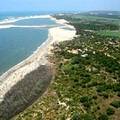 位於非洲東南部沿海地區的莫三比克,將獲得由世界銀行、全球環境基金以及日本政府所資助的3370萬美元,以保護該國的生物多樣性和自然生態系統。在此同時,國際保育組織和聯合國也將與世界自然基金會合作,針對莫三比克國內特有的海洋生物棲息地和野生動物展開保育工作。
位於非洲東南部沿海地區的莫三比克,將獲得由世界銀行、全球環境基金以及日本政府所資助的3370萬美元,以保護該國的生物多樣性和自然生態系統。在此同時,國際保育組織和聯合國也將與世界自然基金會合作,針對莫三比克國內特有的海洋生物棲息地和野生動物展開保育工作。
上週世界銀行董事會通過國際開發協會2千萬美金生態保育貸款案,這筆款項將用在提升以莫三比克地方社群對天然資源的永續使用為基礎的經濟成長與發展。
該計畫將提撥由全球環境基金(GEF)所資助的1,000萬美金,一如2005年10月由全球環境基金委員會(GEF Council)通過的內容,同時日本「政策與人類資源發展基金」也資助3,700萬美金。
這項工作由「跨界保育區」和「觀光發展」兩項計畫同步計畫,目標是要將大範圍、並橫跨多國邊界的自然生態系統,予以完整的保留,藉以保育南部非洲地區的生物多樣性。初步行動的管理將交由「保育區國家理事會」(National Directorate for Conservation Areas)來進行。
提撥的補助金將資助多元目標保育區的建立和管理,以保育三處莫三比克與鄰國交界的跨界生物多樣性地帶。
領導世界銀行此計畫任務小組的帕維(Jean-Michel Pavy)表示:「該計畫執行後,社群將可藉由奇馬尼馬尼、盧邦波和大林波波三個跨界保育區的永續旅遊業成長而增加年收入。」
The conservation of biodiversity and natural ecosystems in Mozambique on Africa's southeastern coast is about to receive supportive grants totalling $33.7 million from the World Bank, the Global Environment Facility and the government of Japan. At the same time, international conservation organizations and the United Nations have joined forces with WWF to conserve Mozambique's unique marine habitat and wildlife.
The World Bank Board of Directors last week approved an International Development Association credit of US$20 million for conservation that will also be used to promote economic growth and development based on the sustainable use of natural resources by local communities in Mozambique.
The project also will be financed by a US$10 million grant from the Global Environment Facility as approved by the GEF Council in October 2005, as well as a US$3.7 million grant from the Japanese Policy and Human Resources Development Fund.
The Trans-frontier Conservation Area and Tourism Development Project is aimed at conserving biodiversity in the southern Africa region by maintaining intact, large natural ecosystems and ecological linkages that span national borders. Management of the initiative will be entrusted to the National Directorate for Conservation Areas.
The grants will finance the establishment and management of multiple purpose conservation areas in three areas with trans-border biodiversity linkages on the Mozambican border with neighboring countries.
“The project will increase revenues for communities from the growth in environmentally sustainable tourism in the three trans-frontier conservation areas (TFCA) of Chimanimani, Lubombo and Greater Limpopo,” said Jean-Michel Pavy, who leads the World Bank Task Team for this project.





